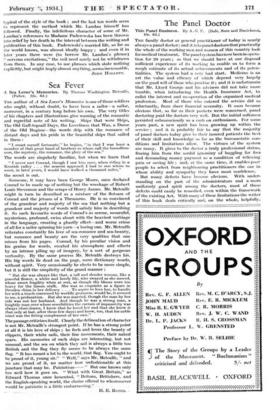Sea Fever
A Sea Lover's Memories. By Thomas Washington Metcalfe. (Faber. 12s. 6d. )
TnE author of A Sea Lover's Memories is one of those soldiers who ought, without doubt, to have been a sailor—a sailor, moreover, in a century long before his own. The very titles of his chapters and illustrations give warning of the romantic and regretful note of his writing. Ships that were Ships, The Old Gaff-topsail Days, the Loveliness that Was, a Dame of the Old Regime—the words drip with the romance of distant days and his pride in the beautiful ships that sailed in them :
"'I count myself fortunate," he begins, "in that I was borrt a member of that great band of brothers to whom call the boundless. ness, the mystery, the romance, the glory of the sea."
The words are singularly familiar, but when we learn that
"I never met Conrad, though I saw him once, when riding in a Kentish valley. . . the nearest approach I had to one whom to meet, in later years, I would have walked a thousand miles,"
the secret is out.
Someone, it may have been George Moore, once declared Conrad to be made up of nothing but the wreckage of Robert Louis Stevenson and the scraps of Henry James. Mr. Metcalfe might in turn be described as a mixture of the flotsam of Conrad and the jetsam of a Thesaurus. He is so convinced of the grandeur and majesty of the sea that nothing but a grandeur and majesty of words will satisfy him in describing it. So such favourite words of Conrad's as serene, mournful, mysterious, profound, swim about with the heaviest verbiage in the language, creating a ghastly effect—and worse crime of all for a sailor spinning his yarn—a boring one. Mr. Metcalfe reiterates constantly his love of sea-romance and sea-beauty, but romance and beauty are the very qualities that one misses from his pages. Conrad, by his peculiar vision and his genius for words, created his atmosphere and effects by an intense piling up of imagery, by a sort of gorgeous verbosity. By the same process Mr. Metcalfe destroys his.
His big 'words lie dead on the page, mere dictionary words, without spirit. Very occasionally he elects to be more simple, but it is still the simplicity of the grand manner :
" But she was always like that, a tall and slender woman, like a graceful flower, a white and lovely lily, who swayed as she moved, whose sweet fragility when at rest, as though the bloom were too heavy for the lissom stalk. She was as exquisite as a figure in Dresden china in her delicacy . . . To aspire to love her, to handle her with a touch coarsened by worldly grossness, would be, it seemed to me, a profanation. But she was married, though the man by her side was not her husband. And though he was a strong man, a knightly man over whose sensibilities the curtain of impassivity was always close-drawn, I knew that he loved her and that she knew it (but only at last, after these few days) and knew, too, that his noble mind was the fitting complement of her own."
The passage criticizes itself. Clearly the delineation of character is not Mr. Metcalfe's strongest point. If he has a strong point at all it is his love of ships ; he feels and loves the beauty of clippers, their white sails, their fine movements, their naked spars. His memories of such ships are interesting, but not unusual, and the sea on which they sail is always a little too British and the flag they fly seems to be always the same flag. " It has meant a lot to the world, that flag. You ought to be proud of it, young sir." "Well," says Mr. Metcalfe, "and
we are proud of it, no matter how unfashionable at this juncture that may be. Patriotism—" But one knows only too well how it goes on. "What with Great Britain," as Edward Thomas once lamented, "Britons, Britishers, and the English.speaking world, the choice offered to whomsoever
would be patriotic is a little embarrassing.". .
. BATEs.








































 Previous page
Previous page